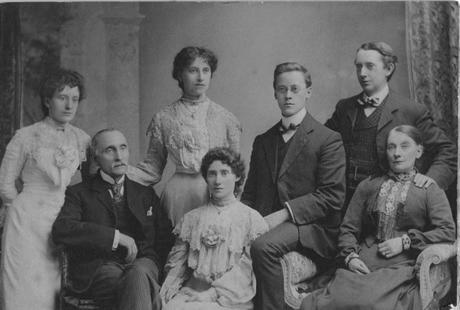
I have now officially read all of Virginia Woolf’s novels, and unfortunately I finished my Woolf reading adventure on one that left me feeling utterly uninspired. The Years, her penultimate novel, is a move away from the impressionistic, stream of consciousness style of her most famous works such as To the Lighthouse and The Waves, and is much more traditional, though certainly not as conventional as The Voyage Out or Night and Day. Its prose is most similar to Between the Acts, though for me, it had none of its beauty or lyricism. Though the earlier chapters, describing the gas-lit streets of Victorian London and shadowy, over-stuffed rooms of the Pargiter family’s home were incredibly evocative and absorbing, as the events moved through to the 20th century, it became increasingly incoherent and rather dull.
The novel centres around the aforementioned Pargiter family, who begin the story in the 1880s in a large, warren-like terrace in Kensington, waiting for Mrs Pargiter, an invalid of some years, to die. As one would expect of a Victorian invalid, she has no identifiable illness, but is just wasting away in a darkened bedroom upstairs, a nurse in constant attendance, while the rest of the family struggle with the guilt of wishing she would just die, and free them all from the tyranny of perpetual sickness. Eventually she does, and slowly the impressive number of Pargiter children drift off to find their places in the world, with several sticking to the conventional roles expected of them, while others take on the stereotypical roles assigned to characters novelists wish to use as symbols of 20th century progress; political agitators, suffragettes, artists, etc. We also meet the Pargiters’ cousins, and over the course of the novel, which skips ahead in sections to significant dates up until 1937, various extended members of the Pargiter family marry, die, have children, become spinsters, move abroad, move to various down-at-heel neighbourhoods and flit in and out of each other’s lives with no real narrative purpose or meaning that I could find besides serving as metaphorical representations of societal change between the 19th and 20th centuries.
Through the characters, Woolf asks questions about the meaning and purpose of life, of work, of war, of relationships, and this is all very well and good, but as we spend so little time with each of the characters, their thoughts and experiences become rather meaningless as there is no opportunity to become invested in or truly understand them. They are all just a series of shifting shadows, and though this is perhaps Woolf’s point about the essential meaningless of human existence, she does cover this ground far more skilfully in Between the Acts, which had a compelling story and characters as well as beautiful writing. While The Years certainly has its moments in the descriptions of the creeping fog, white-pillared crescents and aspidistra dotted drawing rooms of Victorian London, much of the latter portion of the novel is taken up with the unconvincing and very random conversations between various distant relations. In fact, I gave up fifty pages before the end, deciding that life is too short to wade through passages of prose that contain, for me, no pleasure or purpose. I’m sure that for some this book is a masterpiece, but personally, I found it turgid and self-indulgent, and certainly not representative of Woolf’s true powers as a stylist. It’s a strange novel, with the air of being rather unfinished; I felt like it was a first version of what could have gone on to become a brilliant final draft. I’d be interested to hear other people’s opinions of it, however; did I miss something?
